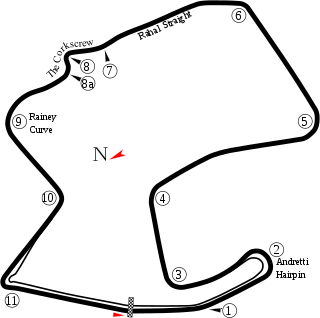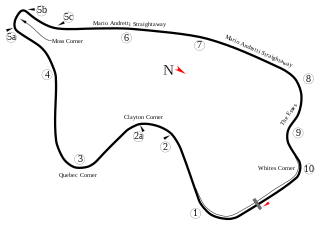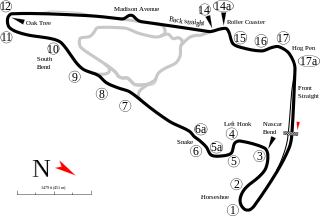Race car groups
The SVRA currently recognizes 12 car groups, with criteria based on car type, age, engine displacement, horsepower, original class placement, and other various technical specifications. [3] The organization largely requires participants to keep the cars as true to their original form as possible, however, certain modern safety modifications are required.
Group 1

Recognized small displacement production sports cars and sedans
Examples:
- Sprite
- Midget
- Mini Cooper
- Triumph Spitfire
- Alfa Romeo Giulietta
- MGA
- Fiat-Abarth
- Lotus 7
- Select G and H-modifieds and D-Sports Racers, Formula Vee
Group 2

Pre-1973 Formula cars.
Examples:
Group 3

Recognized series-produced sports cars and sedans in production prior to 1972.
Examples:
- MGB
- Triumph TR3 and TR4
- Austin-Healey 3000
- Porsche 356
- Elva Courier
- Morgan
- Daimler
- Sunbeam Alpine
- Volvo P1800
Group 4

Limited produced sports cars, racing "specials" and GT cars built or in production prior to 1960.
Examples:
Group 5

World Sports Car Championship and World Manufacturer's Championship GT's and prototypes as raced between 1960 and 1972. USRRC sports cars and Can-Am cars as raced before 1969 with invited later models. Front engine "specials" as raced after 1959.
Examples:
Group 6


Selected big-bore production sports cars and sedans through 1972. This is the group that is utilized for the Vintage Race of Champions (VROC) pro-am series, which includes the Indy Legends Charity Pro–Am race at the Indianapolis Motor Speedway.
Examples:
Group 7

World Championship for Makes sports cars as raced after 1970 on slicks. Under 2.0-liter sports cars as raced after 1972. Center-seat Can-Am cars. SCCA, ASR & BSR, Sports 2000.
Examples:
Group 8

Recognized series-produced sports cars and sedans in production prior to 1979, and later cars by invitation.
Examples:
Group 9

Wings and slicks formula cars complying with SVRA post-1973 formula car regulations.
Examples:
- Formula 1 and Indy Lights
- Formula 5000
- Formula 2
- Formula Atlantic & Formula B (1600cc)
- Formula Super Vee (1600cc, air & water cooled)
- Formula Continental and Formula 3 (1100cc)
Group 10

Selected IMSA and FIA/GT sports cars and sedans as raced between 1973 and 1999. NASCAR Cup/Busch series stock cars. Production-based contemporary cars.
Examples:
- Porsche RSR, 934, 935, 964, 993
- Chevrolet Corvette
- Chevrolet Monza
- Chevrolet Camaro
- Ford Mustang T/A
- Nissan
- Toyota
- Mazda RX-7
Group 11
GTP/Group C, ALMS, PSCR, WSC, Grand Am, and WeatherTech Championship prototype cars as raced from 1981 to five years before the current date. SVRA may permit cars that are deemed obsolete by rules, such as the 2003-16 Daytona Prototype chassis, made obsolete after the 2016 season, before the five-year rule is applied. Tube frame Trans Am and IMSA GTS, GTO and FIA-GT cars as raced from 1981 to specified cut-off date (five years, but SVRA may permit cars once their GT3/GT4 homologation has expired to participate). Production-based contemporary cars based on performance history as raced from 1999 to 5 years prior to calendar year or homologation has expired (car cannot be used in current sportscar racing). Can-Am and A Sports Racing cars as raced after 1967 on slicks, over 6.0 Liters. Center-seat Can-Am cars on slicks over 5.0 Liters.
Examples:
- Aston Martin AMR1
- Intrepid
- Audi R8
- Daytona Prototype 2003-16 (now legal per SVRA)
- Ford Mustang
- Trans Am
- Oldsmobile Aurora
- Pontiac Grand Am
- Porsche GT2 and Cup
Group 12
Select GT sports cars and sedans raced between 1973 and 5 years prior to today's date or when homlogation has expired. These are Production-based cars such as the IMSA Michelin Pilot Challenge or any other stock / prepared racing series once their homologation has expired. Early IMSA GTO and GTU small bore cars will be accepted on an individual basis. SVRA may permit a car no longer permitted in the Pilot Challenge or other similar series to participate in SVRA without regards to the five-year rule.
Examples:
- Chevrolet Corvette
- Dodge Viper
- Ford Mustang
- Panoz,
- Datsun Z cars
- Nissan ZX
- various BMW, Porsche and Ferrari models










